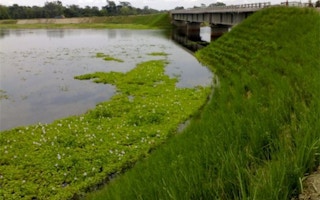Experts and scientists have underlined the importance of planting vertiver grass to prevent erosion, curb pollution and stabilise river banks and sea dykes, paramount in Viet Nam’s battle against sea erosion.
The scientists said at a conference held in central Da Nang City yesterday that vertiver grass had been planted worldwide and was used to protect the 3,200-km Ho Chi Minh Highway from landslides in the wet season.
“The grass has been planted on the Co Co river banks in Ngu Hanh Son district, the Ba Na Hills and sloping roadsides of Son Tra peninsula,” said Da Nang Planning and Investment Department official Tran Van Man.
It was also used in waste water treatment, removing the nutrients as the water passes through it “at low cost while creating a green outlook,” Man said.
The grass roots grew to 3.3m deep in 10 months at a cost of VND60,000 (US$2.8) per 1sq m.
“The roots provide an anchor in the wet season and the grass grows on poor land and near-vertical mountain sides.”
At the conference, Narong Chamchalow, chairman of the committee of the International Convention on Vertiver said the grass was not used for production but rather it saved money by stopping pollution and erosion.
Da Nang will host the 6th International Conference on Vertiver in 2015.
The important role of the grass in climate change mitigation has been recognised by setting up the Viet Nam Vertiver Network – the first in the world.










